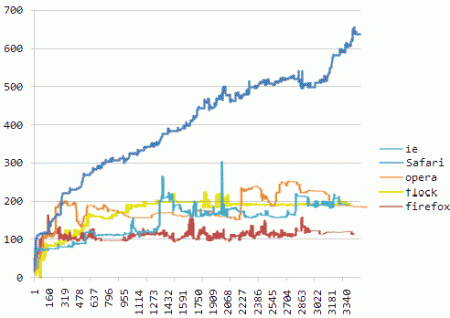Testing memory usage by popular browsers
An interesting test of popular browsers was made by Sam Allen, the results of which were posted on the Dot Net Perls website . He wondered about the browsers' efficient use of memory. To do this, Sam wrote an application that recorded every few seconds the amount of memory used by the browser, after which the author walked on the Internet for more than a dozen hours and collected statistics on the effectiveness of browsers.
The results were as follows:

Thanks to deerua, all the graphs can be visually compared:

I will allow myself an abridged retelling of the conclusions of the test author:
The author’s final conclusion: “After browsing for 14 hours with these programs, and recording all the results into spreadsheets, the most memory efficient browser in my usage is very clear - Firefox 3.0 not only trumps its older version, but every other popular offering on Windows. ". Which generally means that the author prefers Firefox 3.0, as the most efficient in terms of memory usage.
In my opinion, this testing is one of the very few that are somehow related to the actual use of browsers. Unlike, for example, javascript execution speed, browser performance in memory usage is a more noticeable thing for the user.
The results were as follows:

Thanks to deerua, all the graphs can be visually compared:

I will allow myself an abridged retelling of the conclusions of the test author:
- Safari for Windows shows very poor memory efficiency;
- Firefox 3.0 - This browser uses less memory than others;
- Flock (based on Firefox 2.0) - manages memory well and can be used for a long time without any problems;
- Opera 9.5 - at the Flock level;
- Internet Explorer 8 Beta 1 - proved to be not bad, but there is a disturbing dynamics, in any case, the browser normally supports long-term use.
The author’s final conclusion: “After browsing for 14 hours with these programs, and recording all the results into spreadsheets, the most memory efficient browser in my usage is very clear - Firefox 3.0 not only trumps its older version, but every other popular offering on Windows. ". Which generally means that the author prefers Firefox 3.0, as the most efficient in terms of memory usage.
In my opinion, this testing is one of the very few that are somehow related to the actual use of browsers. Unlike, for example, javascript execution speed, browser performance in memory usage is a more noticeable thing for the user.
